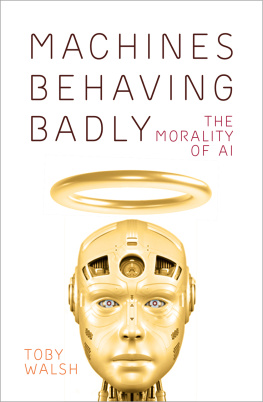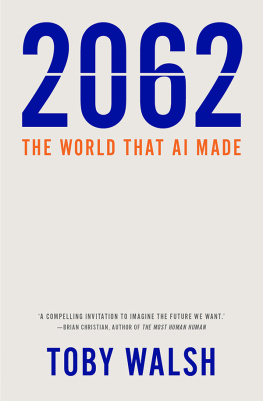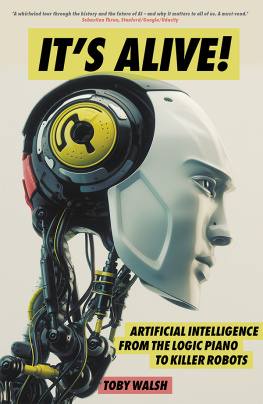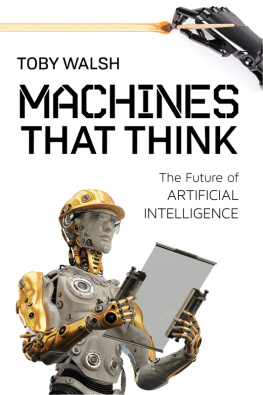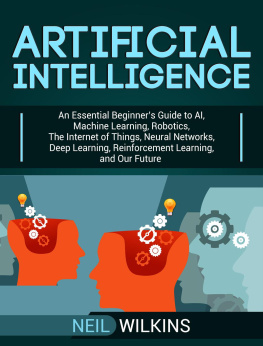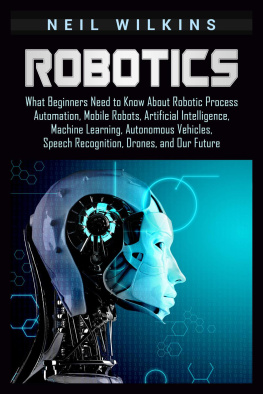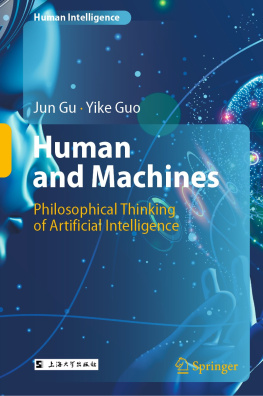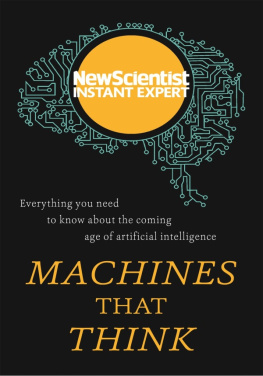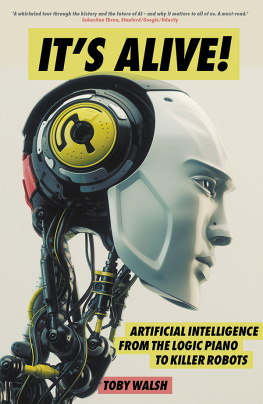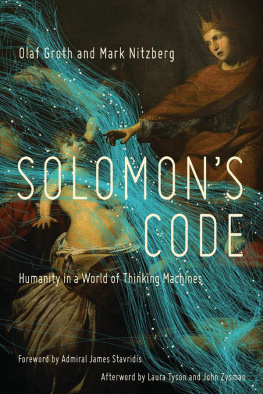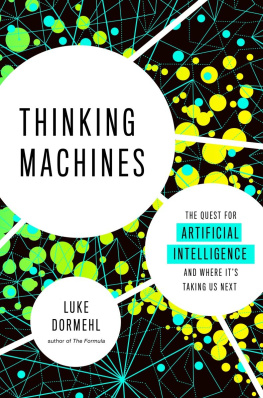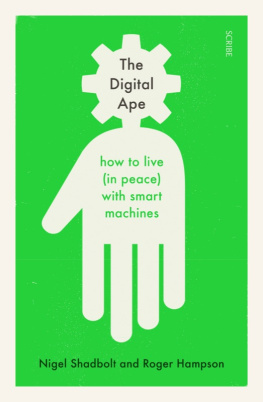Contents
Guide


Published 2022 by arrangement with Black Inc.
First published in Australia and New Zealand by La Trobe University Press, 2022
FLINT is an imprint of The History Press
97 St Georges Place, Cheltenham,
Gloucestershire, GL50 3QB
www.flintbooks.co.uk
Toby Walsh, 2022
The right of Toby Walsh to be identified as the Author of this work has been asserted in accordance with the Copyright, Designs and Patents Act 1988.
All rights reserved. No part of this book may be reprinted or reproduced or utilised in any form or by any electronic, mechanical or other means, now known or hereafter invented, including photocopying and recording, or in any information storage or retrieval system, without the permission in writing from the Publishers.
British Library Cataloguing in Publication Data.
A catalogue record for this book is available from the British Library.
ISBN 978 1 8039 9084 2
Cover design by Tristan Main
Text design and typesetting by Tristan Main
Cover illustrations by Lemonsoup14 / Shutterstock, Mykola / Adobe Stock
Printed and bound in Great Britain by TJ Books Limited, Padstow, Cornwall.
eBook converted by Geethik Technologies

To A and B, my A to Z
But remember, please, the Law by which we live,
We are not built to comprehend a lie,
We can neither love nor pity nor forgive.
If you make a slip in handling us you die!
We are greater than the Peoples or the Kings
Be humble, as you crawl beneath our rods!
Our touch can alter all created things,
We are everything on earthexcept The Gods!
Though our smoke may hide the Heavens from your eyes,
It will vanish and the stars will shine again,
Because, for all our power and weight and size,
We are nothing more than children of your brain!
FROM THE SECRET OF THE MACHINES, BY RUDYARD KIPLING
CONTENTS
AI
You surely know what artificial intelligence is. After all, Hollywood has given you plenty of examples.
Artificial intelligence is the terrifying T-800 robot played by Arnold Schwarzenegger in the Terminator movies. It is Ava, the female humanoid robot in Ex Machina that deceives humans to enable it to escape from captivity. It is the Tyrell Corporation Nexus-6 replicant robot in Blade Runner, trying to save itself from being retired by Harrison Ford.
My personal favourite is HAL 9000, the sentient computer in 2001: A Space Odyssey. HAL talks, plays chess, runs the space station and has murderous intent. HAL voices one of the most famous lines ever said by a computer: Im sorry, Dave. Im afraid I cant do that.
Why is it that the AI is always trying to kill us?
In reality, artificial intelligence is none of these conscious robots. We cannot yet build machines that match the intelligence of a two-year-old. We can, however, program computers to do narrow, focused tasks that humans need some sort of intelligence to solve. And that has profound consequences.
If artificial intelligence is not the stuff of Hollywood movies, then what is it? Oddly enough, AI is already part of our lives. However, much of it is somewhat hidden from sight.
Every time you ask Siri a question, you are using artificial intelligence. It is speech recognition software that converts your speech into a natural language question. Then natural language processing algorithms convert this question into a search query. Then search algorithms answer this query. And then ranking algorithms predict the most useful search results.
If youre lucky enough to own a Tesla, you can sit in the drivers seat, not driving, while the car drives itself autonomously along the highway. It uses a whole host of AI algorithms that sense the road and environment, plan a course of action and drive the car to where you want to go. The AI is smart enough that, in these limited circumstances, you can trust it with your life.
Artificial intelligence is also the machine-learning algorithms that predict which criminals will reoffend, who will default on their loans, and whom to shortlist for a job. AI is touching everything from the start of life, predicting which fertilised eggs to implant, to the very end, powering chatbots that spookily bring back those who have died.
For those of us working in the field, the fact that AI often falls out of sight in this way is gratifying evidence of its success. Ultimately, AI will be a pervasive and critical technology, like electricity, that invisibly permeates all aspects of our lives.
Almost every device today uses electricity. It is an essential and largely unseen component of our homes, our cars, our farms, our factories and our shops. It brings energy and data to almost everything we do. If electricity disappeared, the world would quickly grind to a halt. In a similar way, AI will shortly become an indispensable and mostly invisible component of our lives. It is already providing the smartness in our smartphones. And soon it will be powering the intelligence in our self-flying cars, smart cities, and intelligent offices and factories.
A common misconception is that AI is a single thing. Just like our intelligence is a collection of different skills, AI today is a collection of different technologies, such as machine learning, natural language processing and speech recognition. Because many of the recent advances in AI have been in the area of machine learning, artificial intelligence is often mistakenly conflated with it. However, just as humans do more than simply learn how to solve tasks, AI is about more than just machine learning.
We are almost certainly at the peak of inflated expectations in the hype cycle around AI. And we will likely descend shortly into a trough of disillusionment as reality fails to match expectations. If you added up everything written in the newspapers about the progress being made, or believed the many optimistic surveys, you might suspect that computers will soon be matching or even surpassing humans in intelligence.
The reality is that while we have made good progress in getting machines to solve narrow problems, we have made almost no progress on building more general intelligence that can tackle a wide range of problems. Nevertheless, it is impossible to list all the narrow applications that AI is now being used in, but I will mention a few in order to illustrate the wide variety. AI is currently being used to:
detect malware
predict hospital admissions
check legal contracts for errors
prevent money laundering
identify birds from their song
predict gene function
discover new materials
mark essays
identify the best crops to plant, and
(controversially) predict crime and schedule police patrols.
Indeed, you might think it would be easier to list the areas where AI is not being used except that its almost impossible to think of any such area. Anyway, what this makes clear is that AI shows significant promise for transforming our society.

